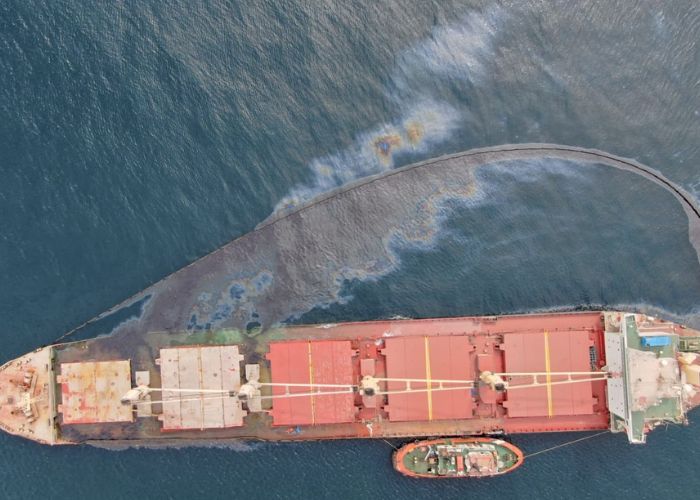The Gibraltar Government says the ‘continuous pumping’ of fuel oil from the tanker OS35, which sank halfway off the coast of Gibraltar after colliding with another vessel, continues. It has been further hampered by a water ingress into the engine room.
The Government indicated the situation remained stable overnight and that oil was continuously pumped out of OS35. However, this happened at a slightly slower pace than expected. On Friday at 7.00 pm, the Gibraltar Government announced that 80 tonnes of low sulphur fuel oil had been removed from tank 2 of the OS35. According to Gibraltar, emptying tank 2 involves removing more than one third of the low sulphur fuel oil from OS35.
Water in the engine room
However, there is now water ingress in the OS 35’s engine room. Therefore, this means that the vessel’s own systems cannot be used to pump fuel out safely. Instead, salvors will need to rely on independent, off-ship systems. A team of divers are investigating the source of water ingress into the engine room. Latest news suggests that the water ingress may be coming under control.
The salvage teams continue the operation to remove fuel from Tank 2. And whilst the majority of fuel has already been removed, the operation has been substantially slowed by this latest development. Consequently, residual quantities of fuel are now being removed.
The Gibraltar authorities also state that ‘continuous monitoring was carried out throughout the night, including thermal imaging with drones and from land’, and that ‘oil leakage from the submerged tanks is being investigated’. In Algeciras, surveillance is also being carried out to see if oil is found on the beaches.
Tank 1
Before work begins to remove the heavy fuel from Tank 1, the Captain of the Port has requested layered booming around the ship. Once in place, it will allow the salvors to commence with the work to remove as much fuel as cleanly and safely possible from Tank. This will only begin once the Captain is satisfied.
The deployment of booms in layers around the ship will prevent the majority of seepage into open water. However, they will NOT provide a watertight layer of containment. This is not technologically possible to achieve.
Moreover, the aim of layered containment is to limit the seepage as much as possible. It is therefore expected that there will be some seepage outside the booms into surrounding open water. This is the unfortunate but unavoidable situation arising from the incident. Work will therefore continue for the rest of the summer or until the salvage operation is completed.
Shoreline clean volunteers wanted
The Department of Environment is leading on land-based clean-up operations. Furthermore, they are actively working with volunteers and non-governmental organisations in order to co-ordinate and safely manage the efforts to clean the shoreline.
Consequently, a shoreline clean is being planned to take place tomorrow (Sunday) in conjunction with the ESG, GONHS and the Nautilus Project. If you would like to volunteer contact the Department of the Environment on info.environment@gibraltar.gov.gi Leave your name, contact details and any particular skills or experience which might be relevant.
Any sightings of oiled seabirds should be reported to the EPRU on (00350) 58009620.


